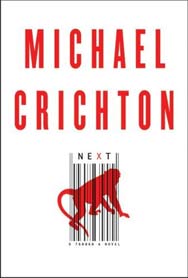 |
Next Michael Crichton ISBN: 978-0060872984 Pub. Date: November 28, 2006 Publisher: HarperCollins |
I don’t know if I read Michael Crichton for education or entertainment.
As I scanned the paperback section of the airport bookstore, “Clever,” I thought. Michael Crichton’s book occupied not one, but three, shelf spaces. The book has three different covers: same design of a monkey and bar code, different background colors of red, green, or white. It worked. I bought a copy.
And this is a usual page turner. Gerald the parrot is the most alive and memorable character. Other are all superficially developed and stereotyped. Then again, you read a Michael Crichton for education and entertainment, not for literature.
He strongly criticized the genetic industry as greedy, anarchical, predatory, and confused. The main point is ownership of genes can people own genes like intellectual properties?
But I own my body and therefore all my genes, if genes can be owned. I then own half of my biological children’s genes too. Unless there was a mutation, they are simply copies of my genes. In fact, biological parents together own all of children’s genes.
Hold on. Grand-parents own parents’ genes, by the same logic. When they die, their properties, including the genes, are inherited by their offspring. Uncles and aunts therefore own all cousins’ genes together. If we pushed upward in the ancestry line, eventually, in legal sense, there is only one possible conclusion: the whole human population together owns the human genome.
This is fun then. If genes can be owned like properties, then genes must be owned by the entire human population, therefore genes cannot be owned by anyone. Without too much effort, one will reach the same conclusion for genes of any species.
No one owns life. How simple and blatantly obvious can that be?
我也ä¸çŸ¥é“我读 Michael Crichton 的著作是为了å¦ä¹ 还是为了娱ä¹ã€‚我在机场书店æµè§ˆå¹³è£…书时,看到 Michael Crichton çš„åŒä¸€æœ¬ä¹¦å æ®äº†ä¸‰ä¸ªä¹¦æž¶çš„ä½ç½®ï¼Œå°±å› 为它有三ç§ä¸åŒçš„å°é¢ï¼šè®¾è®¡æ˜¯ç›¸åŒçš„,都是一åªçŒ´å上覆盖ç€æ¡å½¢ç ,åªæ˜¯èƒŒæ™¯è‰²åˆ†åˆ«ä¸ºçº¢è‰²ã€ç»¿è‰²å’Œç™½è‰²ã€‚我ä¸ç¦æ„Ÿå¹é“:æ¤ä¸¾çœŸæ˜¯èªæ˜Žå•Šï¼è¿˜çœŸæœ‰ç‚¹å„¿ä½œç”¨ã€‚æˆ‘å°±ä¹°äº†ä¸€æœ¬ã€‚è¿™æœ¬ä¹¦çœŸæ— æ³•é‡Šæ‰‹ã€‚é¹¦é¹‰ Gerald 是其ä¸æœ€ç”ŸåŠ¨æœ€ä»¤äººå°è±¡æ·±åˆ»çš„角色。其他角色都ä¸å¤Ÿæ·±å…¥æ‰€ä»¥éš¾å…è½äºŽä¿—套。å†æ¬¡é‡ç”³ï¼Œè¯» Michael Crichton 的书是为了å¦ä¹ 和娱ä¹ï¼Œä¸æ˜¯æ–‡å¦é‰´èµã€‚ä»–å°–é”åœ°æ‰¹åˆ¤äº†åŸºå› å·¥ä¸šçš„å‡ å¤§é—®é¢˜ï¼šè´ªå©ªã€æ— 法ã€æŽ 夺和混乱。最主è¦çš„æ˜¯åŸºå› çš„æ‰€æœ‰æƒé—®é¢˜â€”—人们能åƒæ‹¥æœ‰çŸ¥è¯†äº§æƒä¸€æ ·æ‹¥æœ‰åŸºå› å—?
ä½†æˆ‘çš„èº«ä½“æ˜¯æˆ‘çš„ï¼Œå¦‚æžœåŸºå› èƒ½è¢«æ‹¥æœ‰çš„è¯ï¼Œæˆ‘身体ç†çš„åŸºå› ä¹Ÿå½“ç„¶æ˜¯æˆ‘çš„äº†ã€‚æ—¢ç„¶å¦‚æ¤ï¼Œæˆ‘亲生å女们的一åŠåŸºå› ä¹Ÿæ˜¯æˆ‘çš„ã€‚å› ä¸ºé™¤éžå‘生çªå˜ï¼Œé‚£ä¸€åŠæ˜¯æˆ‘çš„åŸºå› ã€‚å®žé™…ä¸Šç”Ÿçˆ¶æ¯å…±åŒæ‹¥æœ‰ä»–们åå¥³æ‰€æœ‰çš„åŸºå› ã€‚
ç‰ä¸€ä¸‹ã€‚ä¾æ¤ç±»æŽ¨ï¼Œç¥–父æ¯æ‹¥æœ‰çˆ¶æ¯çš„åŸºå› ã€‚ä»–ä»¬åŽ»ä¸–åŽï¼Œä»–们的é—äº§ï¼ŒåŒ…æ‹¬åŸºå› æ‰€æœ‰æƒï¼Œéƒ½ä¼šè¢«ä»–们的åå™ç»§æ‰¿ã€‚å”çˆ¶å’Œå§¨å¦ˆä¼šå› æ¤æ‹¥æœ‰å ‚兄弟å§å¦¹ä»¬çš„åŸºå› ã€‚å¦‚æžœæˆ‘ä»¬é€šè¿‡å®¶æ—血统å‘上追溯,最终,从法律的角度,我们åªæœ‰ä¸€ä¸ªç»“è®ºï¼šæ•´ä¸ªäººç±»æ‹¥æœ‰æ•´ä¸ªäººç±»çš„åŸºå› ã€‚
有趣å§ã€‚å¦‚æžœåŸºå› èƒ½åƒç‰©å“ä¸€æ ·è¢«æ‹¥æœ‰ï¼Œé‚£ä¹ˆåŸºå› çš„ä¸»äººä¸€å®šæ˜¯å…¨äººç±»ï¼Œè€Œä¸æ˜¯ä¸ªäººã€‚ä¸ç”¨å¤šæƒ³ï¼Œä»»ä½•ç‰©ç§éƒ½æ˜¯å¦‚æ¤ã€‚
没有人能拥有生命。这难é“ä¸æ˜¯ä¸è¨€è‡ªæ˜Žçš„å—?
